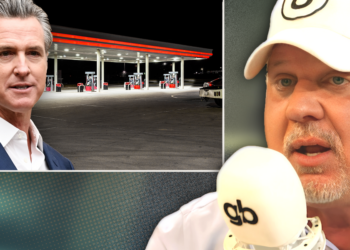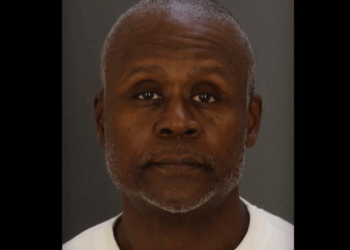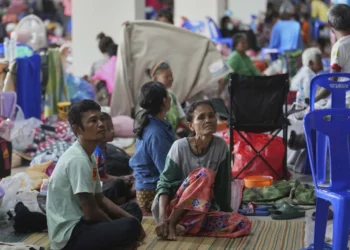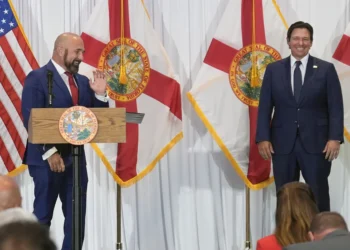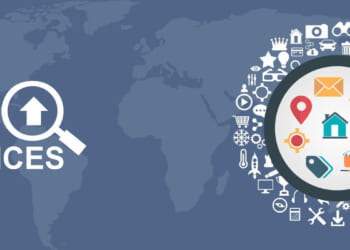On her eponymous show Wednesday afternoon, MSNBC’s Chris Jansing decided maybe it was time to stop pointing fingers over the prevention of last weekend’s devastating Texas floods. Jansing didn’t imply that President Trump, who made cuts to the National Weather Service, was at fault. She didn’t place any definitive blame on Texas officials for not having certain warning systems in place. According to her and her guests, there was no point in assigning guilt since each and every one of us was responsible for not combating climate change sooner.
Jansing asked controversial climate alarmist Michael Mann, the Director of the Penn Center for Science, Sustainability, and the Media, “What does the science tell us about what the future holds?” Unsurprisingly, the guy with a title like that went into a whole spiel about the various reasons climate change was supposedly the biggest factor at play:
Yes, there are a whole bunch of things that came together, but climate change has made these events worse. It’s made them more deadly. And at some level, it’s actually really simple. It’s simple physics that tells us you warm up the planet, you warm up the oceans two degrees Fahrenheit, which is what they’ve warmed up so far, you put about 7 percent more moisture in the atmosphere. So when you get rainfall, you get that much more rainfall.
(…)
And then on top of that, these weather systems are increasingly likely to become stalled. They just sit in the same location day after day. Our own research suggests that that, too, is a pattern that is being favored by human-caused warming. And so you put it all together, you get these extreme flooding events. And even worse, we’re seeing extremes on both sides of the spectrum. So one summer, extremely dry drought, wildfires, the next summer, huge amounts of rainfall.
Of course, most, if not all, of Mann’s claims were either unproven or flat-out wrong.
For example, his statistic of ocean temperatures increasing by two degrees Fahrenheit was accurate, but only if you ignored the fact Mann never gave a timeline for that increase. This two percent change, shown in an EPA graph, began in 1880, before climate change was even a concern, and featured multiple spikes prior to the twenty-first century, demonstrating that these temperature increases were not necessarily as significant as climate activists made it out to be.
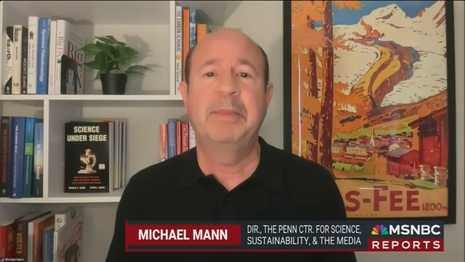 The claims that climate change was stalling storms and causing drastic weather changes were both unproven, neither having any conclusive studies to back them up. Nothing Mann argued actually held any water. Still, Jansing was all in on climate change concerns, asking:
The claims that climate change was stalling storms and causing drastic weather changes were both unproven, neither having any conclusive studies to back them up. Nothing Mann argued actually held any water. Still, Jansing was all in on climate change concerns, asking:
Could this be a turning point … to have at least a larger climate conversation, to maybe talk about the idea of don’t put all your money in after the fact, after people have died, after their communities have been washed away or burned away, but maybe to mitigate before the fact so they don’t have to deal with the after the fact?
Jansing teed Mann up to keep pontificating. For Mann, no amount of preparation could ever be enough if we did not push politicians to enact policy to combat climate change. He argued a clean energy economy was the only way to prevent such tragedies in the future, saying “Mother Nature doesn’t care whether or not politicians believe in climate change. It’s true nonetheless and we’re dealing with the consequences,” without expressing the least bit of sympathy for the tragedy.
The transcript is below. Click “expand” to read:
MSNBC’s Chris Jansing Reports
July 9, 2025
12:09 p.m. EST(…)
CHRIS JANSING: In the last week, we’ve ticked off, we did this at the top of the show, at least four mass flooding events that our climate unit here describe as thousand-year flood events. So, when you look at that and the very smart questions that were just raised by Lewis, tell us what is going on here. What does the science tell us about what the future holds?
MICHAEL MANN: Yeah, there’s no question that climate change is an exacerbating factor here. Yes, there are a whole bunch of things that came together, but climate change has made these events worse. It’s made them more deadly. And at some level, it’s actually really simple. It’s simple physics that tells us you warm up the planet, you warm up the oceans two degrees Fahrenheit, which is what they’ve warmed up so far, you put about seven percent more moisture in the atmosphere. So when you get rainfall, you get that much more rainfall. But that’s just part of it.
It turns out the increase can be much greater than that, not just seven percent, but 20, 30 percent because of the fact that you get more powerful storms that entrain more moisture into the air. And so there’s that factor alone.
And then on top of that, these weather systems are increasingly likely to become stalled. They just sit in the same location day after day. Our own research suggests that that, too, is a pattern that is being favored by human-caused warming. And so you put it all together, you get these extreme flooding events.
And even worse, we’re seeing extremes on both sides of the spectrum. So one summer, extremely dry drought, wildfires, the next summer, huge amounts of rainfall. And then you get these compound events where, for example, because the ground is so parched, it can’t absorb the water that’s coming down, and so it funnels more water into these rivers and you get worse flooding. A whole bunch of things that came together, climate change playing a role in each one of those.
(…)
12:16 p.m. EST
LOUIS AMESTOY: The recriminations, I think, to me right now at this point, aren’t really helpful. I think the bigger question is going to be, does Texas have the political will to say, ‘no, we’re not going to let you build here again? No, we’re not going to let you do this.’ Now, here in Kerr County, climate change discussion, that’s a nonstarter, unfortunately, for elected officials. They don’t believe it. They are not going to, you know, they’re not going to accept it necessarily.
So, I mean, I don’t know what’s going to change their thinking here, but I think that there will be plenty of actions here on this from the National Weather Service front, from the Code Red part of this all the way down to will you give counties at the state level – And remember, Texas has done a really good job of stripping out counties and cities from kind of controlling their own destinies when it comes to urban development and planning and development. And will they allow that to change at the local level, right?
One size doesn’t fit all here in Texas. Kerrville and Kerr County are a heck of a lot different than Austin and Houston and Dallas. And so, that’s going to be an interesting question. And remember our state representative here put a bill up about cloud seeding. So that’s one of my questions I have to answer all the time now. What about the cloud seeding? How did that happen?
JANSING: Yeah. So let me ask you finally, Michael, I mean, if local governments, state governments, and of course the federal government, could this be a turning point, maybe not, as Lewis points out, maybe not in some areas of Texas, but across the country, to have at least a larger climate conversation. To maybe talk about the idea of don’t put all your money in after the fact, after people have died, after their communities have been washed away or burned away, but maybe to mitigate before the fact so they don’t have to deal with the after the fact?
MANN: Yeah, you know, Mother Nature doesn’t care whether or not politicians believe in climate change. It’s true nonetheless and we’re dealing with the consequences. And here’s the thing. Certainly, there are ways to promote more resilient policies, policies that will help people deal with these sorts of extreme events. And we have to reconsider, you know, building codes and where things should be built and where they shouldn’t. All of that is true.
But if we continue to warm the planet and amplify these events, the impacts will exceed our adaptive capacity. There’s nothing that we can do to prevent the harm, the damage. And unfortunately, mortality, if we continue to warm up the planet and amplify, make these events even worse, the droughts and wildfires worse, the floods worse.
What we need to do is put in place policies to deal with the consequences we’re already dealing with and recognize that we have to transition rapidly away from our dependence on fossil fuels towards a clean energy economy, if we want to prevent the worst consequences of climate change. Consequences that will be far worse and far, far more recurrent than what we’re witnessing right now so far this summer.
JANSING: Michael Mann, Louis Amestoy, thank you both. Very important conversation.







